Organic diapers – The alternative disposable diaper for when you don’t have a choice
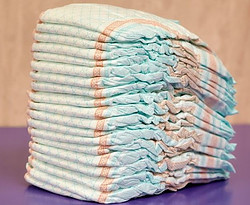 There would be days and occasions that you will not have a choice and you will have to use disposable diapers or nappies. House guests or endless days of rain might make it difficult to wash and dry reusable diapers.
There would be days and occasions that you will not have a choice and you will have to use disposable diapers or nappies. House guests or endless days of rain might make it difficult to wash and dry reusable diapers.
Traveling with a baby or toddler that are in nappies, invariably means that you can’t wash and dry reusable diapers. Going on a car journey it might still be possible, but taking a long haul flight and you don’t have the space or weight allowance to be traveling with enough diapers for the journey.
Storing the used diapers might also be a problem, so one needs to look at what is available as the best alternative to reusable diapers.
What goes into a disposable diaper?
A disposable diaper consists of three layers:
- The inner layer is what touches your baby’s skin and most manufacturers won’t tell you what is in the inner layer. This is the layer that is suppose to stay relatively dry and wick moisture away from your baby’s skin. If your baby has a rash or allergic reaction, it is often because of something in the inner layer. Most manufacturers use polypropylene for the inner layers of disposable diapers. Fragrances are often added to mask the smell of wee and pooh, but this can cause allergic reactions to your baby’s delicate skin. So it makes it even more important to opt for organic diapers.
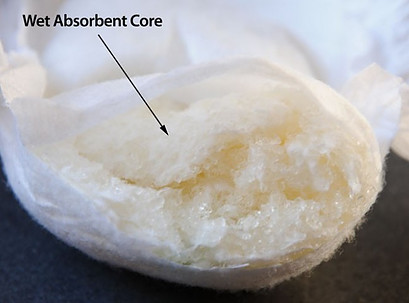
- The middle layer is the absorbent core and is normally a combination of fluffy materials and chemical crystals. The fluffy part is normally made from wood pulp and the role is to distribute fluids across the surface of the diaper. Chemical crystals are used to trap fluids and keep wetness away from your baby’s skin. Most companies use a material called Super Absorbency Polymer (SAP) for the chemical crystals as SAP can absorb up to 300 times its own weight in water and retain it. SAP is derived from petroleum and there might be chemicals in there that are not safe for babies and kids. Not enough testing has been done on SAP to make sure that it is non-toxic and safe. In the past SAP has been linked to Toxic Shock Syndrome (TSS), although it does appear that SAP was not the cause on its own.
- The waterproof outer layer of a diaper prevents any fluids or wetness from leaking out. It is made from plastic or plastic treated material which is typically petroleum based. The waterproof shell in an eco-friendly organic diaper is normally made from a bio plastic or a plant based coating which is known as PLA or polylactic acid. PLA is derived from sugar cane or corn starch.
Other things that are used in manufacturing disposable are adhesive in the tabs and inks or dyes in the designs.
What to look out for and avoid in a disposable diaper
- It must be completely free of chemicals. You want to avoid toxic substances that are harmful to your baby and the environment.
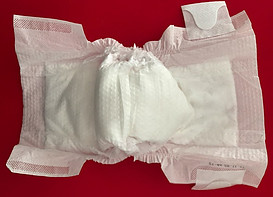
- Chlorine or peroxide is often used to bleach the materials used in disposable diapers. Dioxin, which is a carcinogenic substance, is often found in the presence of chlorine and peroxide. So choose a diaper that is unbleached or chlorine free to avoid dioxins.
- Dyes and inks can be found in the designs (to make the diaper look pretty), the wetness indicator and also in the elastic around the legs and at the back of the waist. Dyes can cause rashes and allergic reactions so make sure that the diaper is free from dyes or that plant based pigments are used. It is best to avoid colorants and heavy metals.
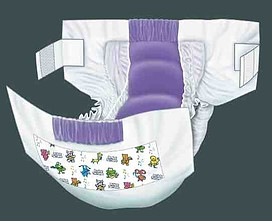
- Latex can be used to add stretch to the diaper, but it can cause allergic reaction, so best to choose latex free diapers
- Perfume or fragrance free: manufacturers are not obliged to reveal or list the fragrances that are used. So many manufacturers hide the chemicals that are used in the fragrance ingredients list. This makes it difficult to establish exactly what is in there.
- Avoid Phthalates which is a group of chemicals that are used to make plastic softer, pliable and more durable. It is often also present in dyes, synthetic fragrances and glues
What is an eco-friendly organic diaper or nappy?
The best alternative to a reusable diaper is an organic disposable diaper. Pulp used in disposable diapers come from forests and an organic diaper should be FSC certified. This guarantees that the pulp comes from sustainable sources. An organic diaper will be made from unbleached materials and free of any chemicals, dyes, fragrances or toxic substances.
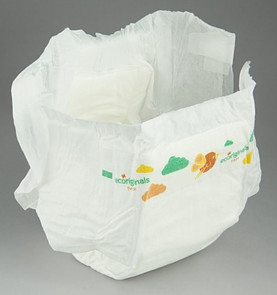 An organic diaper will have a bio plastic or PLA waterproof outer. Eco-friendly organic diapers might cost more than chemical filled diapers, but the benefit to your baby outweighs the slightly higher price.
An organic diaper will have a bio plastic or PLA waterproof outer. Eco-friendly organic diapers might cost more than chemical filled diapers, but the benefit to your baby outweighs the slightly higher price.
The diaper company needs to be transparent about what is in their diapers and products. With many parents demanding to know what is in a disposable diaper, many manufacturers will give you a list of what is NOT in the diaper. If ingredients are not listed or stated, then assume that it is indeed present in the diaper and avoid those diapers.
Your best choice for organic diapers and baby products is from Madeof.com. All their products are made from organic and plant derived ingredients. They are transparent in their lists of ingredients – it is made with nothing to hide. These organic products have NSF organic certification and are certified vegan.
They are also non GMO and gluten free, as well as free of phthalates, parabens, sulfates, synthetic fragrances, SLS, dyes, pesticides, chlorine, BPA and many more. Products that are safe for your baby, yourself and your home.
What happens to a disposable diaper?
A disposable diaper is exactly what it says – you use it once and then throw it away. 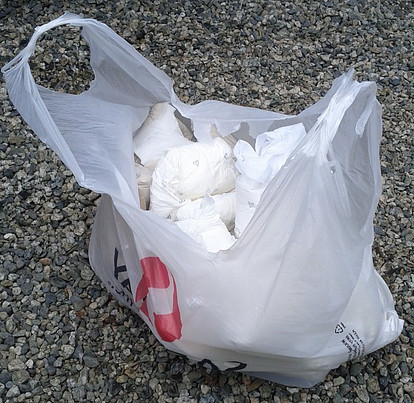
About a third of household waste consists of disposable diapers. It is estimated that approximately 20 BILLION disposable diapers end up in landfills each year, which is quite shocking.
Disposable diapers are often put inside another plastic bag, which makes it even more difficult to bio-degrade. Add to that the fact that it will take approximately 500 years to decompose and the environmental impact is even more horrifying.
Greenhouse gases released from rotting waste is difficult to capture. In the Netherlands an industrial system is being developed whereby diapers can be composted and the methane that is released can be used for fuel. Local governments and manufacturers should and could do more to set up composting systems for bio waste, including nappies.
Research is also being done on manufacturing SAP from plant sources which will make it bio-degradable.
Final Thoughts on Organic Reusable Diapers
Organic diapering is better for your baby’s skin. If you take out a diaper subscription, you can save around $600 annually on your organic disposable diapers. Save money when you buy organic bundles.
If you would like to explore the option of cloth diapers, then this is where you can find out more about reusable diapers.
If you have any comments or suggestions, please leave them below and I’ll get back to you.

Indeed, there are circumstances where using disposable diapers becomes a practical necessity, despite one’s commitment to sustainability. Factors such as hosting guests or facing inclement weather can disrupt the routine of washing and drying reusable diapers, making disposable alternatives a more convenient choice. Similarly, travel presents challenges, especially during long-haul flights or road trips, where space and weight constraints limit the feasibility of carrying an adequate supply of reusable diapers. In such situations, opting for disposable diapers becomes a pragmatic solution to ensure the comfort and convenience of both caregivers and little ones. While it may deviate from preferred eco-friendly practices, acknowledging these occasional needs underscores the importance of flexibility and adaptability in balancing environmental concerns with real-life demands.
Thank you for you helpful comment. Balancing real life demands with environmental concerns, can be challenging, hence the need to remain flexible and look at choices like organic disposable diapers when it is required.
Hi!
Your article is very informative! I didn’t know there were chemicals in disposable diapers, which can cause rashes and irritation for babies. The eco-friendly disposable diapers seems like they are better and baby-friendly. My sister has a baby so I am going to share your article with her.
Thank you for sharing your article with us and I wish you all the best!
Amzy
Hi Amzy, there are many chemicals lurking in diapers and other products, so it is best to use organic products for babies.
What you said is very true that “organic diapers might cost more than chemical filled diapers, but the benefit to your baby outweighs the slightly higher price.” I have a baby and at some point she developed a rash because of these diapers with chemicals. And sometimes they put their diapers on promotion if they have a fault and most people are not aware of that.
And these companies will never be transparent when it comes to what they put in their products. Organic diapers is the way to go if you want your child to be safe.
Organic is the only way to go if you do not want toxic chemicals to be on your baby’s skin. All the best, Liné
For those of you that may have the question: how long do reusable diapers last? I would like to share what I have discovered. As a general point, the less often we have to wash our diapers and covers, the longer they will last. If we choose to diaper with a smaller stash, plan on replacing your diapers every 6-9 months. Don’t think one-size diapers (or sized diapers) will last 2 years if you only have a rotation of 10-15.
Generally speaking you need at least 20 reusable diapers, depending on how often you wash, so thank you for you great recommendation.
Hi Line. Thank you for great review. Im trying to make my life and life of my family more ‘green’ but sometimes its not easy to find ecological alternative for common things. To be fair I never heard before about organic diapers, but it seems a great alternative for disposable ones. There are a bit more expensive, but its worth to pay more for good of our world. Definitely will be sharing this info with my friends.
Organic diapers are better for your baby and also for the environment, so it is a great “green” product.
I never knew there are organic diapers. Wow this platform is wow. Some diapers have a way of causing discomfort for children. But with the information inside this article, I know there won’t be such with this. When it is advised that fragrance are not necessarily needed around the private part, and some manufacturers are still putting it on diaper. This is educative, I love it
It is important to know what you are putting on your baby’s skin, and a diaper or nappy is the closest you can get. Organic is always the best and first choice for a baby.
wow! a great piece. After carefully going through your article on alternative disposable diaper, if religiously taken seriously will help reduce the spread of disease both the child and the parent. To add to the already discused benefit, i found this to be educative aand beneficial if added for holistic reading;some benefits of disposable diapers;
1. They offer convenience
2.They allow for quick change
3. They can come as hypoallergenic which is safe for babies.
on that note,parents should be vigilant when getting diapers for their wards by carefully considering things to look out for and avoid from the article you have provided. This is an incredible article for all to read.Thank.
Hi there, thank you for you kind comments and hopefully more parents will take note that there are better choices available. Liné
What a wonderful piece, you didn’t only focus on reusable diapers. But you also talk about the impact on the environment. I think is high time government start taking this global warming seriously, especially green house effect.
Reusable diapers is very good. But as you said, the company’s that produces them, have to be sincere with the types of chemicals they use. Because our children react strongly on this chemicals. Thanks for outlining this tips on diapers.
Hi there, The amount of disposable diapers in landfill is frightening, and the effect that it has on the environment. Hopefully choosing an organic nappy will help to ease the burden on our planet. Liné
I thoroughly enjoyed reading your article about diapers and the thought of being able to buy an organic version is something that the majority of the population should seriously consider buying. I know the issues that the planet has getting rid of plastic, cotton wool and tissue paper but had not even thought about the number of diapers that get used every year.
I believe in eating and buying products that are organically produced so this is a great article in order to help save our planet and ourselves.
Hi Imelda, It is terrifying when one looks at the amount of waste going into landfill and disposable nappies are a huge contributing factor. At least with organic the harmful effect is a bit less. Liné
Hey Lin…tremendous article on organic diapers, I must say the only introduction of the basic organic diapers has done a lot of good to nursing mother’s…Organic cloth diapers are the most-natural option available for your baby, Made completely from plant-based materials like cotton, hemp, and bamboo, organic cloth diapers provide superior performance when it comes to absorbency and are ultra gentle against baby’s delicate skin.
Thanks for the awesome review
Hi there, Organic is the best choice to have against your baby’s skin, thereby avoiding any harmful chemicals that can affect your baby. Good to hear you enjoyed the review. Liné
Hey nice article you have there. Thanks for this enlightenment, such an interesting fact about disposable diapers. My aunt will definitely sees more than a reason to prefer organic diapers over disposable diapers. I will definitely do well to make some recommendations and refer her to this article for further clarity and guidance in choosing one.
Hi there, These organic diapers are also disposable, but are made without the harmful chemicals that non-organic diapers have. I am sure your aunt will love them. Liné
Wow was a really interesting article. I never knew there was such a thing as organic diapers. What a great idea.
I can’t believe that typical disposable diapers can include all those chemicals in them. I always wondered how they made them smell nice. Back in my babysitting days I have to say we used cloth diapers, now that was 35 years ago. HAHA!
These diapers seem like the only solution for protecting your baby and also protecting the environment. Thank you for sharing this post and I think governments need to look at banning the traditional disposal diaper and mandate everyone use these.
Hi Coralie, Using organic diapers is definitely better for the baby and also for the environment. The best choice in my opinion is reusable diapers, but sometimes it is not practical to use them and then an organic disposable diaper is a good alternative. Liné
Hello,
This was an interesting and well researched article.
You provided a lot of detail about what is used in the making of a disposable diaper.
I never realized there were so many chemicals there until now.
I hadn’t heard much about organic diapers before now but I can really see the advantages of using them.
Thanks,
Cameron
Hi Cameron, It is frightening how many chemicals there are in disposable diapers, so the organic option is definitely the way to go. Thanks for your comment, Liné
The organic diapers are really a good alternative for the disposable diapers. There are indeed times when we never had choice or any option but to make use of some other diapers than the reusable diapers. I never knew about the organic diapers so basically made us of the disposable diapers forgetting it’s effect on the environment at large. But I am so glad I am seeing this article now, we will have a change to making use of the organic diapers when it’s necessary for an alternative.
Hi Sheddy, it is good that there are organic disposable diapers that one can use when it is required. Organic diapers are much better for the baby and also for the environment, so good to know that you will be able to use them when the time arrives.
Going organic is the way to go in other to help our environment. It is good to go organic because of the many benefits these products have. Contamination in some cases can be contributed to materials even though not in use is hard to breakdown, I think that it is better to go organic and these products are being used on a wide scale. Thanks for a thorough review of organic vs disposable diapers I am sure that your viewers especially those with children that are still at the diaper stage will find your post to be useful.
Hi Norman, I do think that it is important what you next to your skin, and specially such a sensitive area as a baby’s bottom. So organic is a far better choice.
Thanks for writing this post. As I noted on another article, my family used cloth diapers with my son, but it isn’t always the most convenient option. I have to admit that it would be much more comforting to know that I was using a disposable diaper that was better for both my baby and the environment. I really like what the Netherlands is attempting to do and hope that idea really takes off in the near future!
Hi Steve, it is as you say that there are occassions that it is far more convenient to use a disposable nappie, rather than a reusable one, specially when you are travelling. It is then good to know that organic disposable diapers are a good alternative, for your baby and mother nature.
Thanks for this most interesting article. Not only are you promoting the reusable diapers, but you are also giving advice in what to buy when it comes to disposable diapers and what will and will not harm the environment.
Many people don’t like using reusable diapers, unfortunately, but it is good to know that there are options out there that will help to lessen the effects on our planet. In this day and age we all need to do our part to save our planet and put less strain on the environment.
With 90% of parents using disposable diapers, it is a big environmental issue, not to mention the harmful chemicals that babies are exposed to. Thankfully there are now organic options available